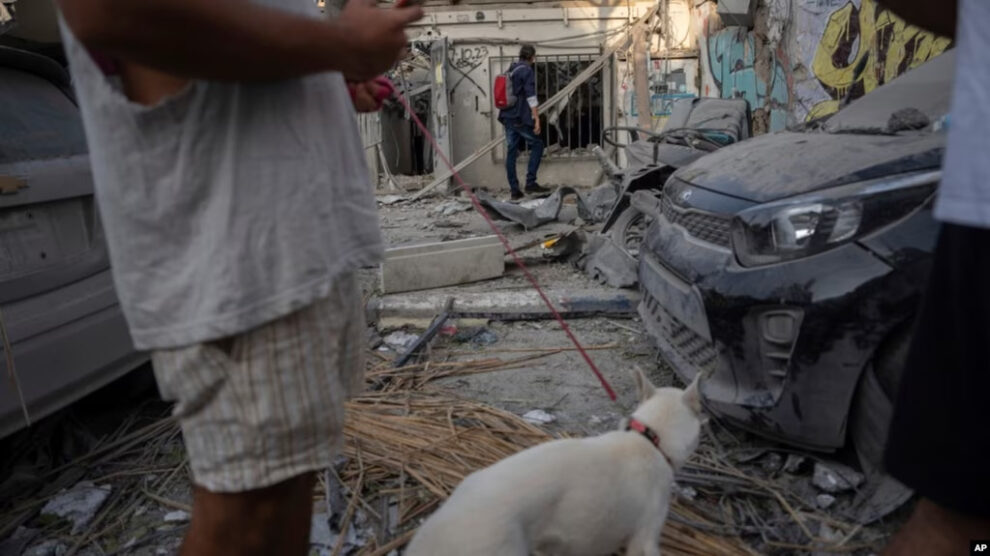Chinese migrant workers in Israel were among those caught up in the middle of airstrikes launched by Hamas this week, even as Beijing has resisted condemning the militant group directly over the attacks.
Speaking with VOA’s Mandarin Service, the workers said they were relieved at seeing how the Israeli anti-missile system worked to intercept rockets from the Gaza Strip and hoped both parties could reach a cease-fire agreement soon.
One Chinese construction worker in Rishon LeZion in central Israel said the attacks this week by Hamas were the worst he had experienced during his 5-year stay there.
“Hamas came on the 7th [of Oct] after breaking through the Israeli border barriers,” said the construction worker, Liu, who refused give his full name. “Rockets have since been flown over above our heads. I’m terrified of being hit by falling rockets.”
Sirens sounded aloud within minutes of when Liu began to speak with VOA Mandarin, which he said were warnings of “the attack by two Hamas rockets.”
Liu said even with the warnings, he and more than 60 Chinese migrant workers, who are housed in an old village on the outskirts of the city, had little place to hide.
“The area we live in has nothing but very old civilian houses,” he said. “There are no air-raid shelters. We can only stay out in the open, observe the direction of flying rockets and look for cover. There’s not much we can do.”
Liu is from China’s Henan province, where his parents, wife and two children live on his salary from abroad.
He said he is concerned about the safety of other Chinese migrant workers in Israel. Many are construction workers who live in shabby steel houses.
Liu said he hopes both parties can reach a cease-fire soon, as they have done in the past so he can resume work, which pays twice as much as he could earn in China.
A Chinese migrant worker, who said his name is Li, told VOA Mandarin that the scale of this week’s Hamas strikes “is relatively big” compared to past conflicts, which he said he’s used to after having worked in Israel for two years.
But Li said his life in the city of Hod HaSharon, north of Tel Aviv, remains mostly unaffected. Li said he only hurried to hide in a shelter when nerve-wracking sirens warned of escalating airstrikes.
Beijing’s neutral stance
Unlike some Chinese netizens, who appear to sympathize with Palestinians, Li showed no hesitation in saying that the war was started by “terrorists from the other side” and it’s only reasonable that “Israel is not happy” and is “fighting back.”
But he said he agrees with Beijing’s decision to stay neutral and isn’t worried that anti-China sentiments could be sparked in Israel if Beijing refuses to criticize Hamas more directly.
“China is a superpower. Only small countries take sides,” Li said. “It’s not appropriate [for China] to express support for either Palestine or Israel. No one wants to go to war. Taking one’s side will invite resentments from the other side. People here are warm and friendly to the Chinese. It is a welcoming environment for the Chinese to work here.”
On Thursday, China’s foreign ministry said three Chinese nationals have been confirmed dead in the conflict. Two others are missing and several have been injured.
On Friday, Israel Defense Forces called on civilians to leave Gaza City “for their own safety and protection” as Israel ramps up preparations for a ground invasion of Gaza including the deployment of 300,000 reservists near the border.
The entire population of 1.1 million people in northern Gaza was urged to relocate to southern Gaza within 24 hours, according to a United Nations statement late Thursday.
China not a friend in need
Despite growing calls for China to condemn Hamas, Sam Chester, a high-tech company executive in northern Israel, said few in Israel expect support from the Chinese government as Beijing is known for decades to have maintained a policy of “friends with all” so that its commercial interests in the region can be advanced, which include access to Arab and Iranian energy reserves and Israeli advance technology.
But after this conflict, Israel may re-evaluate its ties with China, which has proved not to be “a friend in need,” said Chester, who previously worked as a China analyst in Israel.
“I do think Israel will ultimately use it as an experience to have a better sense of who their real allies are, and who may be an ally only when things are good. Hopefully, Beijing will choose the right sort of words and make the right sort of actions,” Chester told VOA Mandarin in a video interview.
Chester said China’s foray as a peacemaker in the region has been “generic and timid,” adding that China’s support in the form of “half-hearted press statements” is massively different from that of the U.S. or EU, which have committed resources to do so.
Chester said the Hamas attacks are considered by many across Israel as a new depth of horror that can only compare to what occurred in the Holocaust. Israeli society wants its army to respond with maximum force in Gaza to eliminate all Hamas and Islamic Jihad, he said. even though some recognize that any military solution may not bring long-term peace.
Source : VOA









